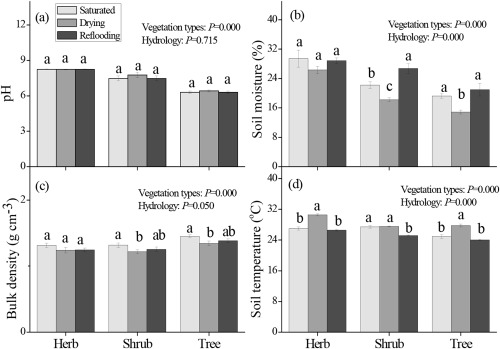Name:ZHANG Quanfa
Tell:
Email:qzhang@wbgcas.cn
Organization:Wuhan Botanical Garden
Hydrologic Pulsing and Vegetation Types Affects Denitrification in the Revegetated Riparian Ecotone
2017-08-31
The denitrification process in the riparian ecotone has received increasing attention to be studied as a means of permanently nitrogen removal and a source of nitrous oxide. Hydrologic pulsing and vegetation are considered to be the most influential factors determining the denitrification in the water-level fluctuation zone. However, how denitrification rate and denitrifier communities respond to hydrologic pulses under different vegetation types in riparian zones remain poorly understood.
Dr. YE Chen, under the supervision of Prof. ZHANG Quanfa from Wuhan Botanical Garden, chose Zhongxian Revegetation area in the ecotone of the Three Gorges Reservoir and simulated four different hydrologic phases including inundated, saturated, drying and reflooding in situ during the hydrologic pulses to identify the responses of denitrification to the hydrologic pulsing and vegetation types and its microbiological mechanism.
Denitrificaition rate was strongly affected by hydrologic pulsing by regulating NO3—N content in the soil, which was higher in the reflooding phase in tree soils than that in the saturated and drying phases.
Denitrifier communities were regulated by physicochemical characteristics such as soil particle size, pH, temperature, moisture, soil organic C, and C:N ratio associated with vegetation types under hydrologic pulsing, with higher abundance of nirS genes and diversity of nirS and nirK genes in herb soils.
However, there was no significant relationship between denitrification rate and denitrifier communities, indicating that the soil environment factors, rather than microbial community composition or abundance of denitrifiers, controlled soil denitrification rate.
Repeated and severe drying-reflooding events due to climate change over long term could enhance denitrification rate in tree plantations and increase the anbandance of denitrifiers in herb soils, which would potentially improve water quality in the riparian zones and adjacent rivers.
Results were published in Journal of Soil Biology & Biochemistry entitle “Hydrologic pulsing affects denitrification rates and denitrifier communities in a revegetated riparian ecotone”. This study was funded by the National Natural Science Foundation of China, and the Executive Office of the State Council Three Gorges Construction Committee and Strategic Priority Research Program B of the Chinese Academy of Sciences .

Soil pH, moisture, bulk density and soil temperature by hydrologic pulsing treatment under three vegetation types (Image by YE Chen)